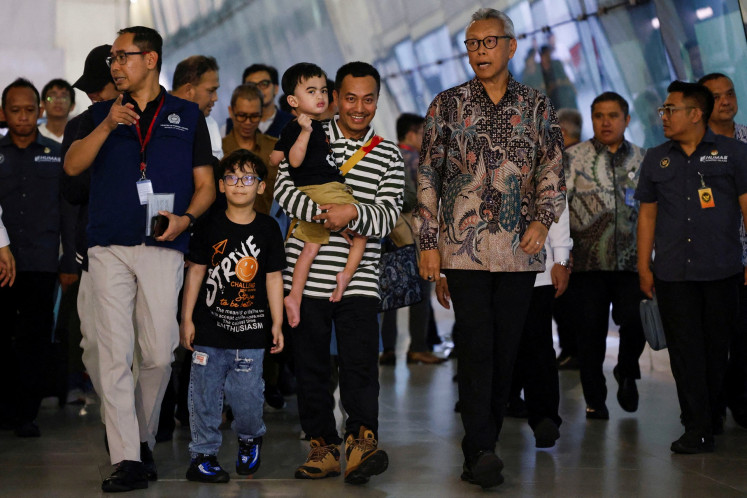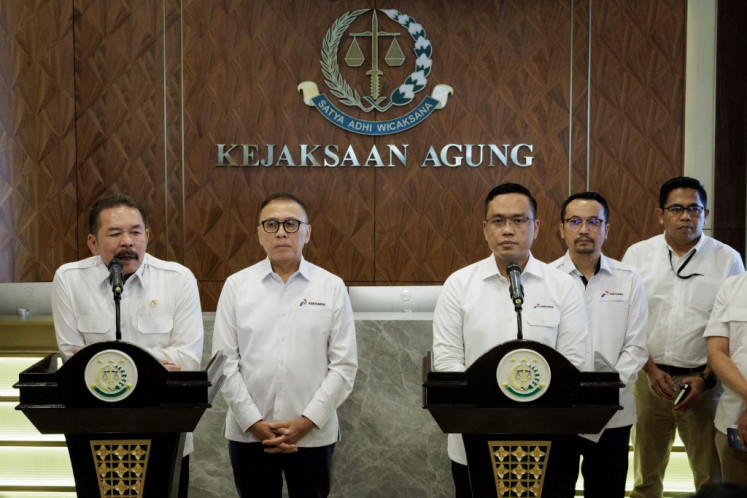Popular Reads
Top Results
Can't find what you're looking for?
View all search resultsPopular Reads
Top Results
Can't find what you're looking for?
View all search resultsBaby orangutan target of illegal trade
Safe and sound: A 1-year-old female baby orangutan sits in her cage after being saved by Natural Resources Conservation Agency (BKSDA) officials and activists from a policeman who allegedly kept her in Patumbak district, Deli Serdang regency, North Sumatra, on Sunday
Change text size
Gift Premium Articles
to Anyone

S
span class="caption">Safe and sound: A 1-year-old female baby orangutan sits in her cage after being saved by Natural Resources Conservation Agency (BKSDA) officials and activists from a policeman who allegedly kept her in Patumbak district, Deli Serdang regency, North Sumatra, on Sunday.(JP/Apriadi Gunawan)
Vulnerable and beautiful, baby orangutans have been targeted by poachers on account of the lucrative trade of the rare animals, environmentalists said.
Concerns over the rampant illegal trade of baby orangutans further emerged following the rescue of a baby orangutan from the home of a police officer in Patumbak district in Deli Serdang regency.
The North Sumatra Natural Resources Conservation Agency (BKSDA) seized the orangutan on Sunday. Found with wounds on its head, the 1-year-old female orangutan was allegedly the victim of illegal trading involving hunters at Mount Leuser National Park in the neighboring province of Aceh.
The BKSDA had deployed an intelligence team to monitor the orangutan before finally confiscating it from the police officer’s house, the agency’s technical division head, Garendel Siboro, said without giving further details on the identity of the officer.
Poachers usually kill an orangutan’s mother before take the baby away to be traded illicitly, he explained.
“Baby orangutans see high demand in the market, but it’s not easy to catch the baby. That’s why hunters usually kill the mother first,” Garendel told The Jakarta Post on Sunday.
Most baby orangutans are poached from Mt. Leuser. As it is a natural habitat of orangutans, the park has experienced destruction due to encroachment, making it easy for hunters to catch baby orangutans, he added.
Gunung Gea, director of the Scorpion Wildlife Trade Monitoring Group, confirmed that the illegal trade of the critically endangered species was rampant in the country, mainly due to the lucrative nature of the practice.
Baby orangutans are sold for between Rp 30 million [US$2,247] and Rp. 60 million. The species is usually traded at 1-year-old. Prices are usually lower when the orangutan is older than 1-year-old,” he said.
His organization recorded that most of the orangutans were traded overseas. One of the cases involved an orangutan that was smuggled from Kalimantan to Kuwait. The group had sent a letter to the Environment and Forestry Ministry last year to bring back the baby orangutan so that it could be released into its natural habitat in Indonesia. Yet, there has been no response from the government.
Gunung lambasted the lack of supervision by law enforcement officials of the rampant illegal trade of the rare species. In fact, many law enforcers have been implicated in holding the illegally traded animals.
“The baby orangutan confiscated in Deli Serdang [allegedly] belonged to a police officer. This is proof that law enforcers might be involved,” he added.
The baby orangutan is being quarantined in Batu Mbelin village, Sibolangit district in Deli Serdang, said Yenni Saraswati from the Sumatran Orangutan Conservation Program SOCP).
The orangutan will remain in the facility for the coming months for further observation before being released back into the wild.
Yeni said the orangutan was malnourished and wounded.
Panut Hadisiswoyo, founding director of the Orangutan Information Center (OIC), said last year the organization had rescued 28 orangutans.
“We rescued 12 of them from illegal trading, and we have sent them to be quarantined in Batu Mbelin. We took another 16 from a plantation because they were living in unsafe conditions because of rampant hunting and killing,” he said.
The protected animals, which only live in Sumatra and Kalimantan, the Indonesian part of Borneo Island, still face rampant illegal trading, contributing to their decreasing population. Data from the Center for Orangutan Protection (COP) showed orangutans were critically endangered, with a population 5,000 orangutans in Sumatra and 7,000 in Kalimantan, at present.









